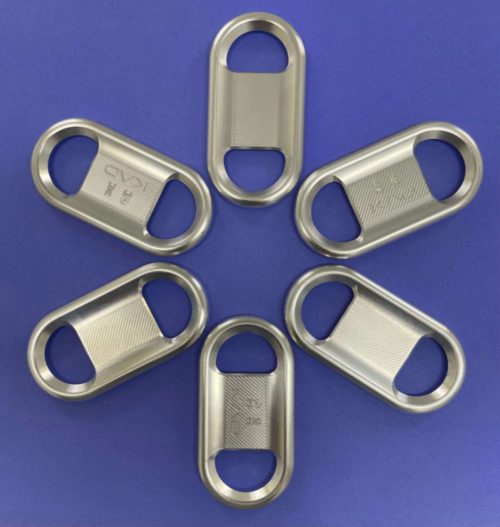Choose the Right Aluminum Alloy for Your CNC Machined Prototype
Aluminum is one of the most common material choices for CNC machining services. Known for being lightweight but strong and having excellent corrosion resistance, aluminum is also a favorite of machinists. The material is easily machinable and yields consistent, high-quality prototype models.
But not all aluminum alloys are created equal. For example, did you know that the rigid 7075 aluminum can easily shatter during machining? Or that the purest form of aluminum, 1100, is actually the toughest to manufacture?
The aluminum you choose can impact not only part functionality but cost and lead time as well.
Aluminum Series Explained
There are currently over 400 aluminum and wrought aluminum alloys approved by The Aluminum Association Inc.
The four-digit Wrought Alloy Designation System characterizes each aluminum and aluminum alloy by series (1000-8000) according to defining properties, like thermal response, mechanical treatment, and primary alloy element.
The lower the series, the more pure the aluminum. But the purest form isn’t always the best option for prototype CNC machining. For instance, although 1100 aluminum is one of the purest forms, 6061 aluminum (composed of magnesium and silicon) is generally much more cost-effective.
Often, aluminum is sold according to application: 7075 aluminum is typically known as aircraft-grade aluminum, to name one example. But that designation is really a misnomer; aerospace clients might prefer 2024 aluminum (known as architectural aluminum) for its oxidation resistance in some cases.
The bottom line is that you should always choose a type of aluminum based on the properties your part requires.
6 Common Aluminum Alloys
When choosing an aluminum alloy, consider all factors and properties from manufacturability to functionality. But remember that in the rapid prototyping phase, strength differential may not matter as much as cost and availability.
Here’s the rundown on the 6 most common aluminum alloys:
- 1100 aluminum. This corrosion-resistant and highly conductive aluminum alloy is ideal for electrical applications. As the purest (and most expensive!) form of aluminum, 1100 is soft and absorbent, making it difficult to machine compared to other types of aluminum.
That’s no problem for a skilled machinist, though. At KAD, we approach machining 1100 a little differently, leaving out the standard cutting fluids we would typically use.
- 2024 aluminum. Known as architectural aluminum, 2024 is much more machinable than 1100. It offers high strength and excellent corrosion resistance—but at a higher cost than standard 6061 aluminum. 2024 aluminum is most often available in box tubing, L shape, and round tubing extrusions, though it can be custom made in thick gauge or aluminum plate forms, too.
- 5052 aluminum. If you need a thick alloy, 5052 is often readily available in thicknesses up to ⅜”. It is most commonly used for sheet metal fabrications such as bent housings, boxes, and formed components where flatness is key. 5052 offers mild corrosion-resistance, and is very malleable and machineable. Although the cost is comparable to 6061, it’s not as useful for a fast-turn prototype model.
- 6061 aluminum. When you need a fast-turn rapid prototype or a production run, we most often recommend 6061. Its reasonable cost and easy machinability make it the most common aluminum alloy. Those benefits are especially important during production manufacturing when you’re making parts at scale. 6061 is an excellent aircraft grade aluminum for high-strength applications. It’s readily available in a wide variety of shapes, as well as plate and bar stock.
- 7075 aluminum. Also used in aircraft components, 7075 is a high-strength alloy. It’s available in most thicknesses and shapes, but it’s less corrosion-resistant than 6061 and often requires secondary post-processing operations to maintain a good finish and prevent oxidation. Whereas 6061 can sit for months and still retain its shine, 7075 will begin to show black marks relatively quickly depending on the environment.
- Cast plate. When flatness is a top priority, cast plate is a sturdy, cost-effective choice for big tooling or fixture plates.
At KAD, we’re happy to assist with your aluminum material choice, and are prepared to machine whichever alloy you select! If you’re interested in using aluminum for your prototype model, let us help steer you in the right direction. Contact us today for prototype CNC machining services.



